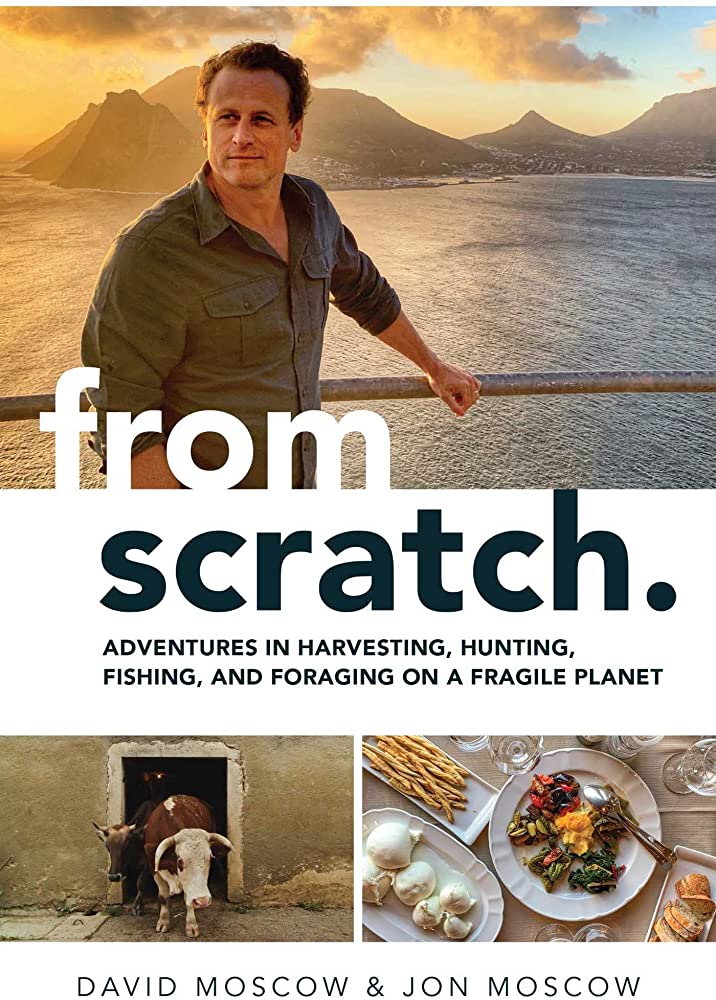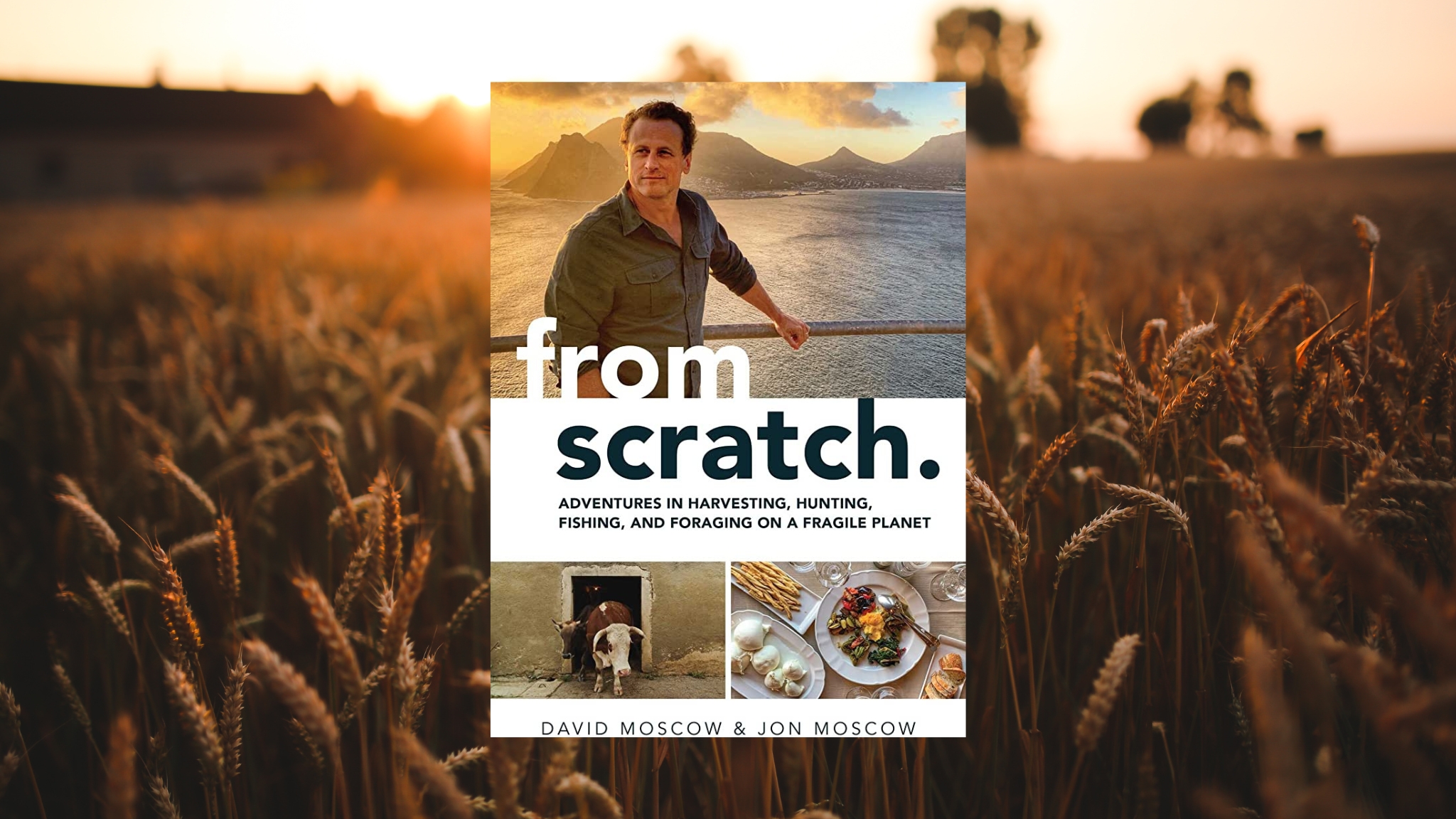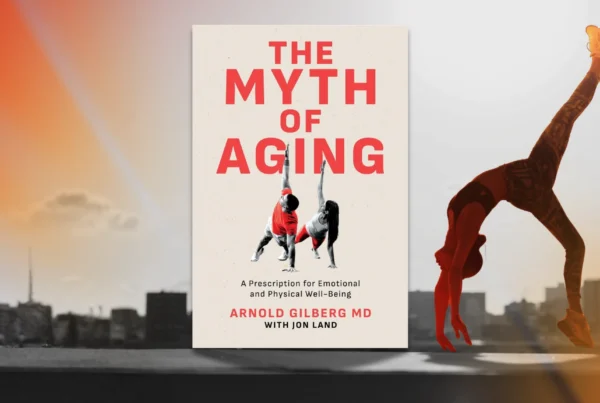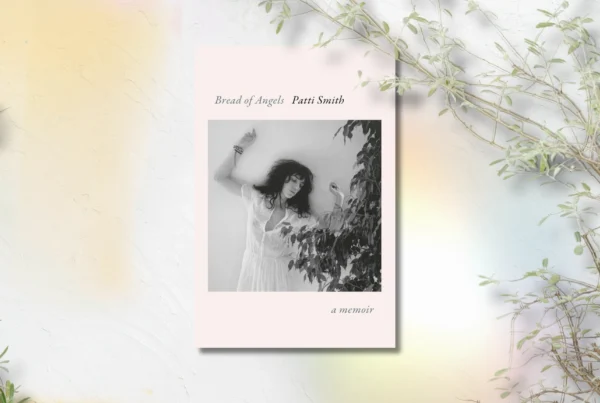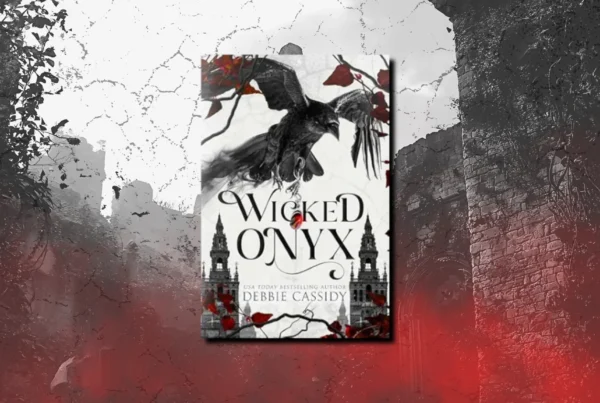From Scratch: Adventures in Harvesting, Hunting, Fishing, and Foraging on a Fragile Planet by David & Jon Moscow
What do you get when you combine an engaging host bursting with enthusiasm and joie d’ vivre that spills out onto the page, inviting the reader to join him on a global travel and food adventure of a lifetime?
From Scratch (Permuted Press) is the companion book to the hit television series of the same name that was five years in development. The show first aired in the pandemic year 2020 and quickly won a loyal following with 20 episodes produced and shown in two seasons and a third soon to follow. The show has partnered with Tastemade and can now be viewed on all of their streaming channels.
The subtitle of this provocative, fascinating and informative work of nonfiction is “Adventures in Harvesting, Hunting, Fishing and Foraging on a Fragile Planet”. After reading it, you may never again take food sources for granted and likely will develop a greater appreciation for consuming fresh foods in their natural season. We humans are gently reminded that we have a responsibility to be stewards and conservators of our world’s tenuous ecosystems.
Inspired by the Hit Television Series
Co-authors David Moscow and his father Jon Moscow honor the food growers, harvesters, hunters, cooks and chefs who daily feed the inhabitants of our planet Earth. Using the language of everyman, David Moscow has in ten chapters documented his travels, explorations, apprehensions and occasional mishaps.
He is self-deprecating, often hilariously so, ever empathetic and down-to-earth as he travels the globe with his co-producer wife Karen Moscow, their young son and a small crew to participate in and write about how food gets to the table. The author modestly states in the preface to From Scratch he is “just an actor, playing a host posing as a journalist” but clearly has achieved far more in tackling tough environmental and huge politically charged questions and issues concerning getting the world’s populace fed.
In the words of David Moscow, the premise for the television show and book is: “I would travel to countries around the world, and each week I’d meet with a chef, famous or not, fancy or not, eat a meal they cooked, and then go out to harvest ingredients for that meal.” After discussing the history of the ingredients, he would be taught by these same experts how to farm, forage, fish or hunt for the makings of the lunch or dinner and would have one week to assemble the components to replicate the dishes he had consumed at the beginning of each episode.
There would be no shortcuts or cheating by shopping in the nearest city’s supermarkets to aid in this filmed culinary scavenger hunt that turned a lifelong city dweller into a temporary hunter-gatherer. Hard work, hope, luck and guidance from local villagers engaged in food production were key elements in this journey.
This book allows the authors the opportunity to discuss the profound nature of the stories shown more superficially on cable television. They are able to focus on the environmental impact of climate change, pollution, the consequences of overfishing, deforestation, poor land management, loss of wildlife, lack of connection with nature, and the unrealistic demand for year-round, out-of-season foods.
From Scratch allows the authors to examine how food production interconnects the world with the realization of “how much work we have ahead of us to save ourselves and our companions on this fragile planet.”
Farming, Fishing, Foraging and Hunting Across the Globe
The chapters cover topics including the revival of oyster farming in New York State, foraging for dune spinach for a meal in Cape Town, Johannesburg with stops in Malta and Sardinia for beer making and meals of octopus and snails. David Moscow found the experience of hunting for wild game in Texas and Wyoming to be particularly challenging as well as a sobering, humbling experience. “I realized that when I’m eating meat, I am ultimately responsible for an animal’s death whether I kill it directly or simply have it arrive on my plate.” (This chapter may make some readers uncomfortable.)
He goes to the Philippines for round scad, a fish used to make this island nation’s ubiquitous fermented fish paste, then hunts for potatoes in Peru and Utah. Peru is home to over 2,800 native varieties of potatoes. In southern Utah, there are many lessons to learn from the Dine (Navajo) who serve as caretakers of the land; the indigenous foods grown, including potatoes, are highly valued in their creation story and when eaten reaffirm their connection with Mother Earth.
In the chapter Cod, Scallops, Salt: Iceland, David Moscow states this “Technical genius and talent, mixed with knowledge, joy, and pride, is quite a combination,” about Dill’s Executive Chef Gunnar Karl Gislason whose previous restaurants in Denmark and Dill in Iceland have all received Michelin stars.
David encounters dishes with goat, barley and honey in Kenya where he also consumes the traditional mixture of milk and blood with his Maasai hosts. Our author, unlike some previous author chefs who gleefully consumed virtually anything proffered, is often quietly revulsed by some of the indigenous delicacies and wondering how he will get and keep them down to avoid offending his hosts. We’re off on a far-flung journey to seek mushrooms; porcini in Finland and chanterelles on Whidbey Island, Washington.
The chapters conclude with lessons in mozzarella and pizza making on the Amalfi Coast. There are 10 recipes included and I confess the only one I have tried and will make again is the simple one for Margarita pizza!
Readers Will Reflect on Their Own Food Sources
Jon Moscow compiled a comprehensive bibliography in the Endnotes. With From Scratch, the authors have provided a crucial work that is informative and entertaining while challenging us to respect and be gentle to our good earth. This ambitious journey around the globe would be impossible for most, but gleaning and foraging opportunities of locally grown foods do exist in virtually every town and city.
On a personal note, their work has allowed me to reflect on happy instances when I have been privileged to forage or gather ingredients for my own meals with friends or family beginning in early childhood with mushroom hunting in a Bavarian forest with my late mother. We also paused in our chilly swimming and sunbathing along the shores of Lake Superior in Marquette, Michigan to gather refreshing handfuls of ripe wild blueberries that grew profusely among the dunes.
Dupont Circle in Washington, DC is seasonally full of mature trees dropping luscious, huge, sweet mulberries that turn the sidewalks and your hands purple as you fill containers to enjoy at home. Ravenna Park in Seattle was an excellent source for watercress and the woods near the Presidio in San Francisco before the military post closed yielded miner’s lettuce and varieties of wild mushrooms sufficient to make a tasty stew with a friend who was an officer in the local Mycological Society.
A Mount Baker campsite provided an abundance of chanterelles while on a rare day in Oregon the Deschutes River trout practically leapt into one’s creel. Kuna, Idaho was the place to go in spring for wild asparagus before subdivisions proliferated and wiped out the source.
Blackberries, raspberries, huckleberries and strawberries will still be ready for foraging in season. Of course, one needs to be respectful of the land and observe any laws prohibiting gathering, ensuring that any necessary permits are obtained. For example, while wild foods grow in abundance in some areas like Mammoth Cave National Park in Kentucky or Rock Creek Park in Washington, DC, it is illegal to remove any specimens even for consumption by the individual.
If gleaning or foraging, one should harvest in moderation, leaving plenty for others and not disturb roots or damage the plant’s ecosystem. Also, pick up any trash and leave an area cleaner than when you arrived at the site. Stalking the Wild Asparagus, a definitive field guide to foraging, published in 1962, has never been out of print. Its author Euell Gibbons is widely regarded as the “father of the foraging movement.”
David Moscow and Jon Moscow may have earned their own place in the canon of books that encourage readers to respect and live in part off the land. If you lack the time or place to glean or forage, do visit a farmer’s market or a you-pick orchard soon to savor the flavor and freshness as well as the experience of harvesting your own fruits or vegetables. As Woody Guthrie wrote and sang, This Land is Your Land. Please preserve Mother Nature for future generations.
About the Authors:
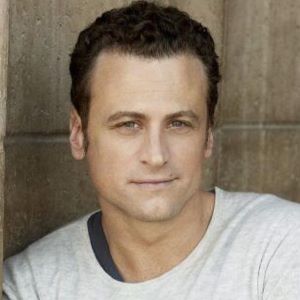 David Moscow is the creator, executive producer, and host of From Scratch. David made his feature film debut at age thirteen in Big, starring as the young Tom Hanks; soon after, he starred with Christian Bale in Newsies. He has appeared in dozens of films, television shows, and theater productions over a thirty-five year career.
David Moscow is the creator, executive producer, and host of From Scratch. David made his feature film debut at age thirteen in Big, starring as the young Tom Hanks; soon after, he starred with Christian Bale in Newsies. He has appeared in dozens of films, television shows, and theater productions over a thirty-five year career.
Most recently, David founded the production company UnLTD Pictures. He has executive produced more than twenty feature films, including Under the Silver Lake, To Dust, Strawberry Mansion, and Wild Nights with Emily. He also directed the thriller Desolation.
David currently lives in LA with his wife and son—and develops mixed-income sustainably green apartment buildings in NYC.
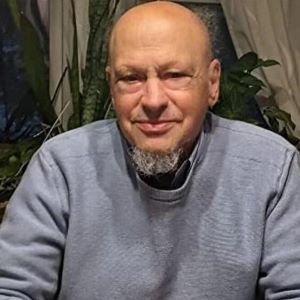 Jon Moscow is David’s father, creative partner, and a writer on From Scratch. He is co-executive director of Ethics in Education Network and co-host of the Ethical Schools podcast. He actively works to support asylum seekers with housing and links to social services. He has a BA in International Studies from Reed College and a master’s degree from Bank Street College of Education. He and David’s mother, Pat, live in Teaneck, NJ, with a Shih-Tzu named Niki.
Jon Moscow is David’s father, creative partner, and a writer on From Scratch. He is co-executive director of Ethics in Education Network and co-host of the Ethical Schools podcast. He actively works to support asylum seekers with housing and links to social services. He has a BA in International Studies from Reed College and a master’s degree from Bank Street College of Education. He and David’s mother, Pat, live in Teaneck, NJ, with a Shih-Tzu named Niki.
